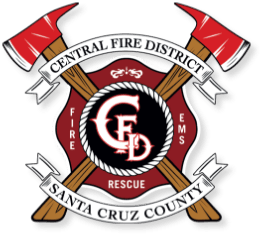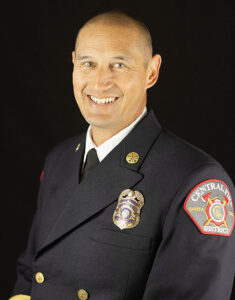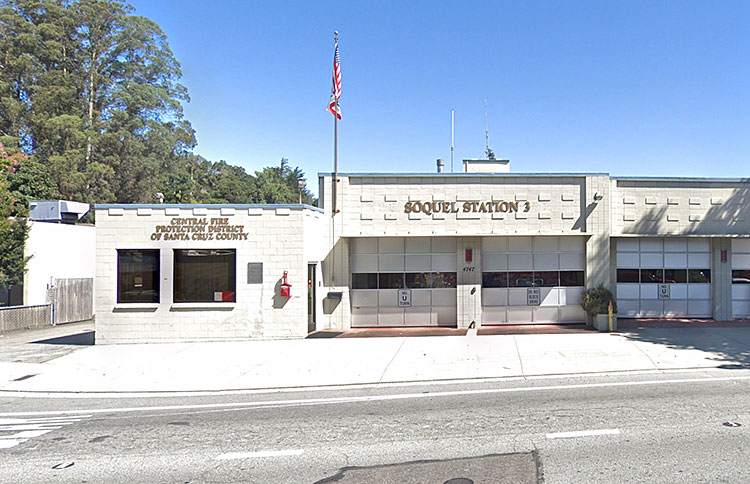 Central Fire Chief Jason Nee, 50, will retire this year. He joined Central Fire in 1999. He lives in Santa Cruz with his wife of 22 years and has two children, a son in college and a daughter who is a high school senior. He also has a chocolate lab named Coco.
Central Fire Chief Jason Nee, 50, will retire this year. He joined Central Fire in 1999. He lives in Santa Cruz with his wife of 22 years and has two children, a son in college and a daughter who is a high school senior. He also has a chocolate lab named Coco.
In an email interview, he shared highlights of his service.
•••
Was there a moment you knew you wanted to get into firefighting? What drew you to the job?
During college, my father set up a ride-along with San Jose Fire and Central Fire Santa Cruz through some acquaintances.
My first ride-along was at San Jose Fire Station 1, one of the busiest fire stations in the nation. I was amazed at the skills, knowledge and expertise that the fire crew possessed that I knew nothing about.
During my first ride-along at Central Fire Santa Cruz, I found myself holding the infant of a patient during a medical incident.
I had never held a child at that point in my life and it was clear to me that the dynamic nature of the job was enticing, and I was open to the challenge.
How has the job of firefighting changed since you started?
The fire service has become more accountable, more aware, and more professional than when I started. The fire service overall is much more aware and open to creating a healthy work environment to prevent cancer, behavioral health issues, and maintaining physical fitness.
 The fire service is also providing more services than we ever have before. Many agencies in the state are providing Advanced Life Support through the staffing of firefighter/paramedic staff. Other agencies provide ambulance transportation services.
The fire service is also providing more services than we ever have before. Many agencies in the state are providing Advanced Life Support through the staffing of firefighter/paramedic staff. Other agencies provide ambulance transportation services.
Locally, there are agencies that provide ocean rescue and technical rescue services.
What was your scariest day on the job?
I have never thought about this question before.
I remember responding as part of state-wide mutual aid to the Rim Fire near Yosemite in 2013. I had never seen a smoke column with the size and anger that smoke column had. At the time, it was the 3rd largest fire in California history, that mark has since been surpassed.
I recall responding to the Martin Fire in Bonny Doon in 2008. We drove through very dangerous situations to arrive at our assignment.
The scariest day is easily the day I was promoted to Fire Chief.
You became chief in 2022 during the Covid pandemic. How did the pandemic change your job?
Before Covid, I didn’t know much about the California Department of Public Health (CDPH). During Covid, we were forced to follow the ever-changing guidelines of CDPH on what seemed like a weekly basis.
If you recall, there was confusion everywhere you turned for guidance. The real challenge was updating policy to reflect the changing recommendations and ensuring that the communication of those changes was understood by the staff.
The job frequently transitioned from administrator to public health expert and back.
Firefighting is a statistically risky profession. What can be done to make it safer?
There are numerous factors that could make the career of a firefighter safer.
These include cultural acceptance of behavioral health challenges, preventative measures to minimize exposure to cancer-causing products of combustion and continuous training and development of staff to maintain a safe working environment in dangerous, challenging situations.
What do you wish local residents knew about Central Fire?
The men and women of Central Fire work very hard to provide the best service possible in a challenging, dynamic environment.
There are many issues that all local governments face, and Central Fire is not immune to the pressures of rising costs for apparatus and construction, climate change, and staffing challenges.
Despite these pressures, we continue to provide excellent service with safe and professional staff.
What would you tell somebody who was starting out in the firefighting business today?
If you love your job, you will never work a day in your life.
The fire service is an honorable occupation that can create lifelong friendships and exciting opportunities, all while providing an invaluable service to the community.
There is significant purpose in the work that the fire service does, and there is no better purpose than to help your community in their time of need.
What made you decide it was time to retire?
I had planned on retiring on my 50th birthday, during the first 20 years of my career. Once promoted to the position of Fire Chief, I realigned my wants and expectations to better align with the organization’s needs.
There is a natural lifespan to this position that has run its course. Most of my generation of employees have already left or will soon. I do not want to hinder the organization by staying too long, and prevent other motivated members from continuing to move the organization forward.
I would rather be asked to stay than asked to leave.
What will you do in your retirement?
In retirement, I want to focus on my physical and mental health, as well as spend time with my family.
These dimensions of my life have been neglected due to my career path, and they deserve attention.
Central Fire Chief Jason Nee



